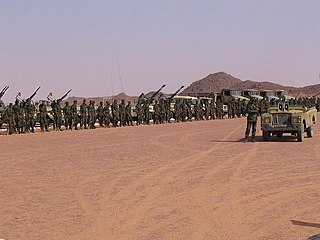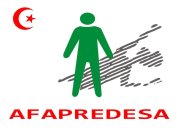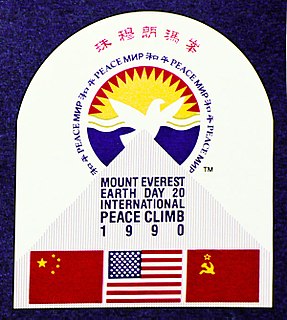
North Africa is a region encompassing the northern portion of the African continent. There is no singularly accepted scope for the region, and it is sometimes defined as stretching from the Atlantic shores of Mauritania in the west, to Egypt's Suez Canal and the Red Sea in the east. Others have limited it to the countries of Algeria, Morocco, and Tunisia, a region that was known by the French during colonial times as "Afrique du Nord" and is known by Arabs as the Maghreb. The most commonly accepted definition includes Morocco, Algeria, Tunisia, Libya, Egypt, and Sudan, the 6 countries that shape the top North of the African continent. Meanwhile, "North Africa", particularly when used in the term North Africa and the Middle East, often refers only to the countries of the Maghreb and Libya. Egypt, being also part of the Middle East, is often considered separately, due to being both North African and Middle Eastern at the same time.

The United Nations (UN) is an intergovernmental organization that aims to maintain international peace and security, develop friendly relations among nations, achieve international cooperation, and be a center for harmonizing the actions of nations. It is the largest, most familiar, most internationally represented and most powerful intergovernmental organization in the world. The UN is headquartered on international territory in New York City; other main offices are in Geneva, Nairobi, Vienna and The Hague.

The United Nations Economic and Social Council is one of the six principal organs of the United Nations, responsible for coordinating the economic and social fields of the organisation, specifically in regards to the 15 specialised agencies, the eight functional commissions and the five regional commissions under its jurisdiction.

Western Sahara is a disputed territory on the northwest coast and in the Maghreb region of North and West Africa, partially controlled by the self-proclaimed Sahrawi Arab Democratic Republic and partially occupied by neighboring Morocco. Its surface area amounts to 266,000 square kilometres (103,000 sq mi). It is one of the most sparsely populated territories in the world, mainly consisting of desert flatlands. The population is estimated at just over 500,000, of which nearly 40% live in Laayoune, the largest city in Western Sahara.

The International Organization for Migration (IOM) is an intergovernmental organization that provides services and advice concerning migration to governments and migrants, including internally displaced persons, refugees, and migrant workers. In September 2016, IOM became a related organization of the United Nations. It was initially established in 1951 as the Intergovernmental Committee for European Migration (ICEM) to help resettle people displaced by World War II. As of March 2019, the International Organization for Migration has 173 member states and eight observer states.

Indigenous peoples, also known in some regions as First peoples, First Nations, Aboriginal peoples or Native peoples, or autochthonous peoples, are ethnic groups who are the original or earliest known inhabitants of an area, in contrast to groups that have settled, occupied or colonized the area more recently. Groups are usually described as indigenous when they maintain traditions or other aspects of an early culture that is associated with a given region. Not all indigenous peoples share this characteristic, as many have adopted substantial elements of a colonizing culture, such as dress, religion or language. Indigenous peoples may be settled in a given region (sedentary) or exhibit a nomadic lifestyle across a large territory, but they are generally historically associated with a specific territory on which they depend. Indigenous societies are found in every inhabited climate zone and continent of the world except Antarctica.

Non-governmental organizations are organizations that are independent of any government. They are usually non-profit. Many of them are active in humanitarian or social areas. However, NGOs can also be lobby groups for corporations, such as the World Economic Forum.

Minority Rights Group International (MRG) is an international human rights organisation founded with the objective of working to secure rights for ethnic, national, religious and linguistic minorities and indigenous peoples around the world. Their headquarters are in London, with offices in Budapest and Kampala. MRG has an international governing Council that meets twice a year. MRG has consultative status with the United Nations Economic and Social Council (ECOSOC) and observer status with the African Commission on Human and Peoples' Rights.
Indigenous land rights are the rights of indigenous peoples to land, either individually or collectively. Land and resource-related rights are of fundamental importance to indigenous peoples for a range of reasons, including: the religious significance of the land, self-determination, identity, and economic factors. Land is a major economic asset. The majority of indigenous peoples living in forest areas depend on the natural resources of their lands to fulfill their subsistence needs. Hunting, fishing, gathering of forest products, and small garden plots still form the basis of their household economy. The security and permanence of their control and use of the natural resource base is actually more important to most indigenous groups than direct ownership of the land itself. The demand for ownership, in fact, derives from the need to ensure their access to these resources, so it is of particular importance to examine how the different national-level legal regimes handle this aspect of indigenous ownership. Land is also an important instrument of inheritance and it is a symbol of social status. The land is essential for people's spiritual development. The land is sacred and everything they get from the land is a gift from their gods. Losing their land means a loss of contact with the earth and a loss of identity. Land is not only an asset with economic and financial value, but also a very important part of people's lives, worldviews and belief systems.

The Western Sahara conflict is an ongoing conflict between the Polisario Front and the Kingdom of Morocco. The conflict originated from an insurgency by the Polisario Front against Spanish colonial forces from 1973 to 1975 and the subsequent Western Sahara War against Morocco between 1975 and 1991. Today the conflict is dominated by unarmed civil campaigns of the Polisario Front and their self-proclaimed SADR state to gain fully recognized independence for Western Sahara.

The United Nations Permanent Forum on Indigenous Issues is the UN's central coordinating body for matters relating to the concerns and rights of the world's indigenous peoples. "Indigenous person" means native, original, first people and aboriginal. There are more than 370 million indigenous people in some 70 countries worldwide. The forum is an advisory body within the framework of the United Nations System that reports to the UN's Economic and Social Council (ECOSOC). The first indigenous to be elected to office at a United Nations meeting was Chief Ted Moses of the Grand Council of the Crees in Canada, in 1989.

Africa is the world's second-largest and second-most populous continent, after Asia. At about 30.3 million km2 including adjacent islands, it covers 6% of Earth's total surface area and 20% of its land area. With 1.3 billion people as of 2018, it accounts for about 16% of the world's human population. The continent is surrounded by the Mediterranean Sea to the north, the Isthmus of Suez and the Red Sea to the northeast, the Indian Ocean to the southeast and the Atlantic Ocean to the west. The continent includes Madagascar and various archipelagos. It contains 54 fully recognised sovereign states (countries), eight territories and two de facto independent states with limited or no recognition. The majority of the continent and its countries are in the Northern Hemisphere, with a substantial portion and number of countries in the Southern Hemisphere.

Asociación de FAmiliares de PREsos y DEsaparecidos SAharauis (AFAPREDESA), is an exile-based Sahrawi human rights organization, campaigning against human rights abuses perpetrated by Morocco against Sahrawi people in Western Sahara and even Morocco itself. It focuses especially on the question of the Sahrawi "disappeared", and had campaigned extensively in the past for the release of political prisoner Muhammad Daddach. It is the only Sahrawi human rights Non-governmental organization officially recognized by the Sahrawi Arab Democratic Republic. Due to this, it is banned in the Moroccan government-controlled part of Western Sahara, operating there clandestinely.
The World Council of Indigenous Peoples (WCIP) was a formal international body dedicated to having concepts of aboriginal rights accepted on a worldwide scale. The WCIP had observer status in the United Nations, a secretariat based in Canada and represented over 60,000,000 Indigenous peoples worldwide.

The Western Sahara War was an armed struggle between the Sahrawi indigenous Polisario Front and Morocco between 1975 and 1991, being the most significant phase of the Western Sahara conflict. The conflict erupted after the withdrawal of Spain from the Spanish Sahara in accordance with the Madrid Accords, by which it transferred administrative control of the territory to Morocco and Mauritania, but not sovereignty. In late 1975, the Moroccan government organized the Green March of some 350,000 Moroccan citizens, escorted by around 20,000 troops, who entered Western Sahara, trying to establish a Moroccan presence. While at first met with just minor resistance by the POLISARIO, Morocco later engaged a long period of guerrilla warfare with the Sahrawi nationalists. During the late 1970s, the Polisario Front, desiring to establish an independent state in the territory, attempted to fight both Mauritania and Morocco. In 1979, Mauritania withdrew from the conflict after signing a peace treaty with the POLISARIO. The war continued in low intensity throughout the 1980s, though Morocco made several attempts to take the upper hand in 1989–1991. A cease-fire agreement was finally reached between the Polisario Front and Morocco in September 1991. Some sources put the final death toll between 10,000 and 20,000 people.

Indigenous rights are those rights that exist in recognition of the specific condition of the indigenous peoples. This includes not only the most basic human rights of physical survival and integrity, but also the preservation of their land, language, religion, and other elements of cultural heritage that are a part of their existence as a people. This can be used as an expression for advocacy of social organizations or form a part of the national law in establishing the relation between a government and the right of self-determination among the indigenous people living within the borders of Canada, or in international law as a protection against violation of indigenous rights by actions of governments or groups of private interests.

Henri Lhote was a French explorer, ethnographer, and discoverer of prehistoric cave art. He is credited with the discovery of an assembly of 800 or more works of primitive art in a remote region of Algeria on the edge of the Sahara desert.

Jeremy Keenan is a British social anthropologist. The regional focuses of his research are the Sahara, North Africa and the Sahel region. Concerning the contents, he concentrates on anthropology of development, security and globalisation. During the last years, he has published a number of books and articles about the approaches of the United States to counter terrorism in Africa.

Environmental globalization refers to the internationally coordinated practices and regulations regarding environmental protection. An example of environmental globalization would be the series of International Tropical Timber Agreement treaties, establishing International Tropical Timber Organization and promoting sustainable management of tropical forests. Environmental globalization is usually supported by non-governmental organizations and governments of developed countries, but opposed by governments of developing countries which see pro-environmental initiatives as hindering their economic development.

Cherif Rahmani was the Algerian minister for supply in the 1995 government of Mokdad Sifi. He was the Minister of Tourism around 2002 and created the World Deserts Foundation.















